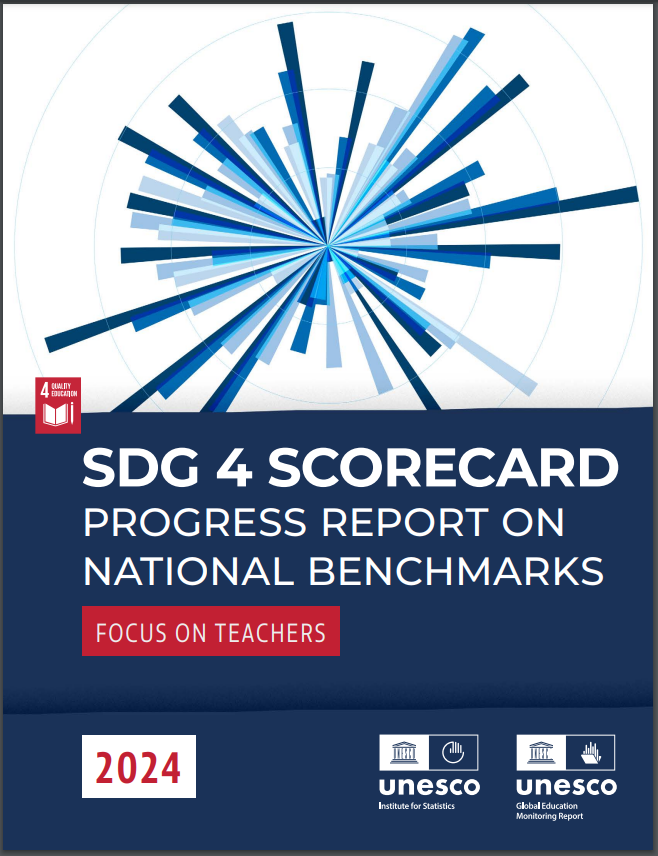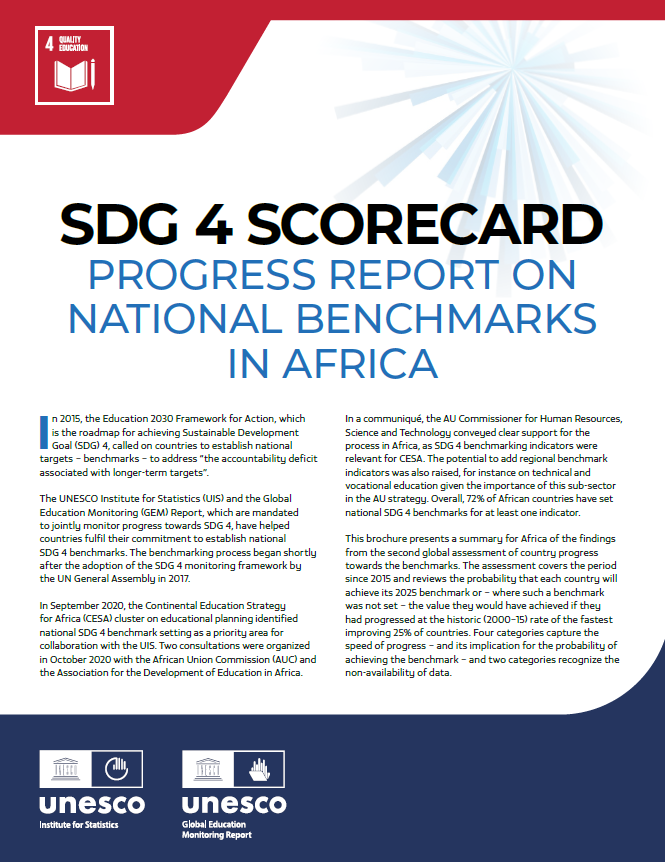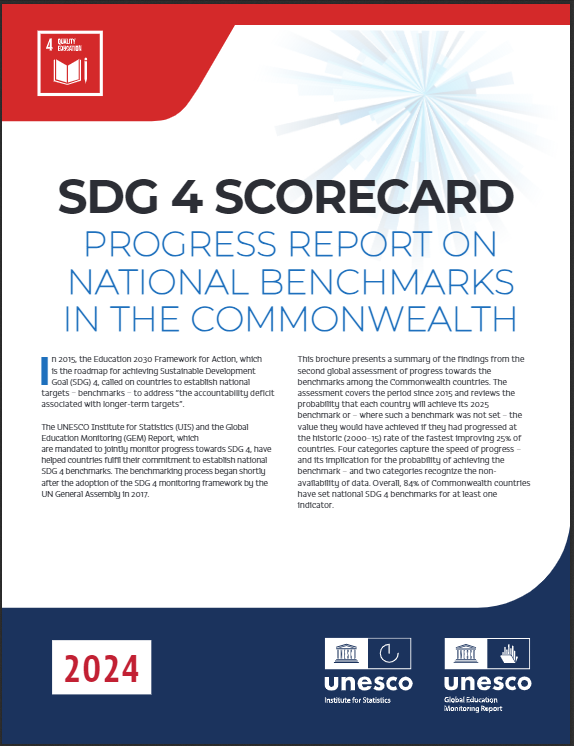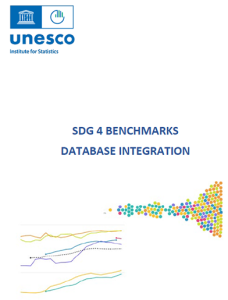SDG 4 Scorecard progress report on national benchmarks: focus on teachers
The SDG 4 Scorecard shows countries’ efforts towards achieving their 2025 and 2030 national benchmarks, which represent their intended contributions to the achievement of SDG 4. Progress towards national targets is insufficient: countries are making good progress in Internet connectivity at school and teacher qualifications, but progress on the 6 other benchmark indicators is not on course.
Download the scorecard
English | French | Spanish
Download the brochure
‘National SDG 4 Benchmarks and the SDG 4 Scorecard’
Download the brochure
‘SDG 4 UIS data digest and scorecard series’
- Data gaps (Dashboard - Map)
- SDG 4 Scorecard Dashboard
SDG 4 Scorecard progress report on national benchmarks in Africa
...
The SDG 4 Scorecard for Africa is a summary of the findings from the 2nd global assessment of country progress towards benchmarks since 2015. Overall, 72% of African countries have set national SDG 4 benchmarks for at least one indicator.
SDG 4 Scorecard progress report on national benchmarks in the Commonwealth
This brochure presents a summary of the findings from the second global assessment of progress towards the benchmarks among the Commonwealth countries since 2015. Overall, 84% of Commonwealth countries have set national SDG 4 benchmarks for at least one indicator.
Download the Commonwealth scorecard English
SDG 4 Benchmarks Database Integration
SDG 4 Benchmarks Database Integration
‘SDG 4 Benchmarks Database Integration’ was prepared by the UNESCO Institute for Statistics to present the methodology followed in assembling the benchmarks database. The document describes the different phases of the benchmarking process and explains how countries’ submissions were managed upon reception. It also describes the results and outstanding issues associated with benchmarks derived from National Education Sector Plans and Voluntary National Reviews, and ends with a section on the management of the benchmarks database.
Check out the blogs
We need to transform education for this generation to be prepared for the future
By Silvia Montoya, Director, UNESCO Institute for Statistics (UIS), and Manos Antoninis, Director, Global Education Monitoring (GEM) Report
A call to action on the follow-up of the Transforming Education Summit commitments
By GEM Report
Making commitments at the Transforming Education Summit – and following up on them
By David Sengeh, Minister of Basic and Senior Secondary Education, Sierra Leone
Countries’ SDG 4 benchmarks forecast more than 80 million children and youth will still be out of school by 2030
By GEM Report and UNESCO Institute for Statistics
What are the national SDG 4 benchmarks?
By GEM Report and UNESCO Institute for Statistics
A promise kept: more than half of countries set SDG 4 national benchmarks
By Silvia Montoya, Director, UNESCO Institute for Statistics (UIS), and Manos Antoninis, Director, Global Education Monitoring (GEM) Report
Timeline of SDG4 Benchmarking process
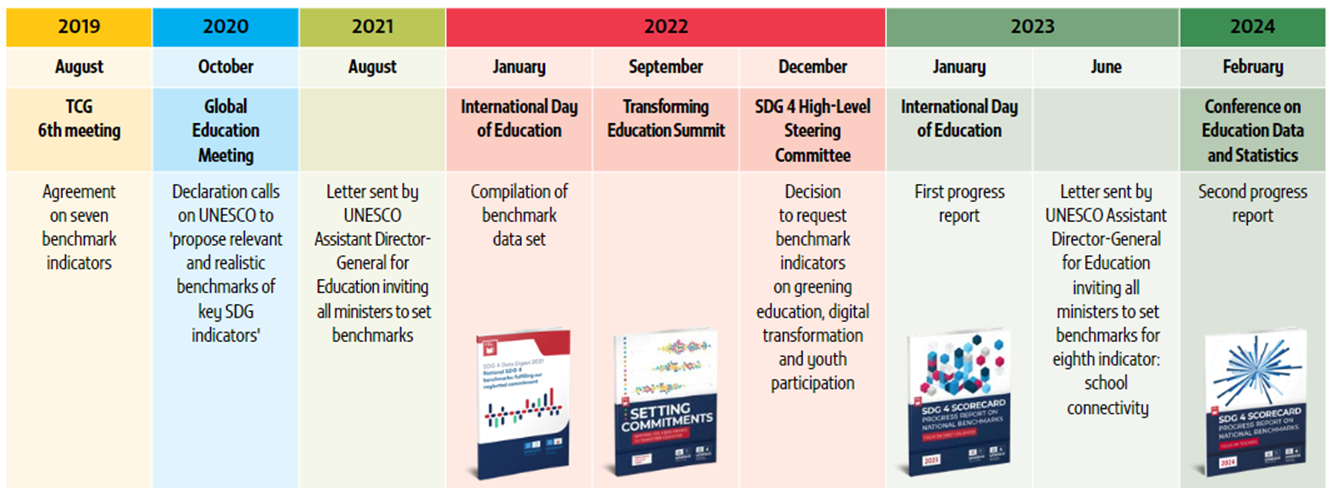
The extraordinary session Global Education Meeting in October 2020 reminded countries of their commitment to the Declaration, which called on “UNESCO and its partners, together with the SDG-Education 2030 Steering Committee, to … accelerate the progress and propose relevant and realistic benchmarks of key SDG 4 indicators for subsequent monitoring” (§10).
The effectiveness of the process to set, monitor, and act on benchmarks rests on two factors:

In response, countries and international governmental organisations have designed regional education plans to articulate the SDG 4 Targets.
The main objective of benchmarks is to draw attention to data gaps and introduce a coordinated mechanism to flag countries that may be falling behind in terms of certain key indicators.
The technical process for setting regional benchmarks is briefly presented here and is explained in greater detail in the following paper: Benchmarks for SDG 4 Indicators: A Political and Technical Basis for Discussion.
Proposed interim national benchmarks
Until countries select their own benchmark for each of the seven SDG 4 Indicators, the following interim national benchmark approach is proposed.
Despite the fact that the two approaches differ, regions could opt for a variation that includes both approaches. The need for countries to take an active role in setting their benchmarks is envisaged in the Framework for Action.
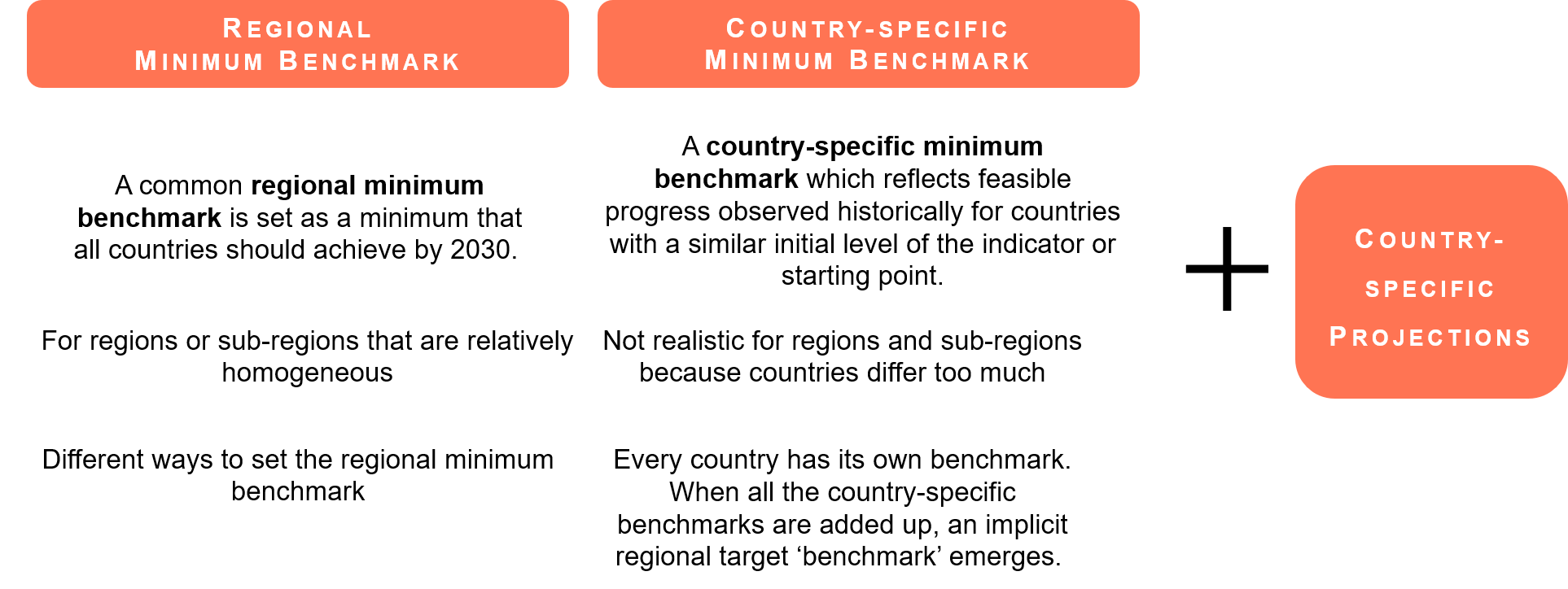
Find out more here.
Orientation Sessions have been offered to Members States of all regions as support for the establishment of national benchmarks values for SDG 4 Indicators for 2025 and 2030.
Presentations
On 13 July 2021, the global community convened at the 2021 Global Education Monitoring Meeting - Ministerial Segment and invited Member States to
submit national benchmarks on the seven SDG 4 - Education 2030 benchmarking indicators for UNESCO to compile and present at the
High-Level Segment of the Global Education Meeting in November 2021.
Find out more about the 2021 Global Education Monitoring Meeting and view the GEMR and UIS PPT presentation.
The UIS and the Chair of the UIS governing board convened the Norwegian Agency for Development Cooperation (NORRAD), the German Gesellschaft für Internationale Zusammenarbeit (GIZ), Bill and Melinda Gates Foundation and UNICEF to discuss the SDG 4 benchmarking exercise, and donors and partners roles on 17 February 2021.
Various areas were discussed and explored:
- Use the UIS benchmark dashboard to identify data gaps and drive coordinated investment in solutions;
- Identify where commitment and capacity need to be strengthened; and
- Identify the potential of regional data coordination initiatives to enable political engagement on data issues.
Presentation
Are benchmarks fair? Are countries far from and close to the goal treated the same way?
All countries committed in 2015 to set their own benchmarks, in other words their own contribution to the achievement of the global education goal by 2030. But the contribution of each country will be measured not in terms of whether they meet the (absolute) level but whether their (relative) progress rate is fast enough. The methodology used sets different levels for each country to achieve but the same progress rate, given their level of educational development, which should be faster than what was observed in the past.
What is the difference between proposed and national benchmarks?
The methodology assesses where countries are and where they could be if they progressed at rates faster than the average progress observed in the past, given their level of educational development. These projected (‘feasible’) values are also proposed benchmarks and the basis for discussion. Each country can then decide whether it wants to set its benchmark at a higher, more ambitious level.
COVID-19 is expected to negatively affect education outcomes. What happens in that case?
For many countries, COVID-19 is expected to slow down or even reverse their educational progress. This factor cannot yet be incorporated in proposed benchmarks that are being set for 2025 and 2030, in other words they are medium- to long-term objectives. By that time, countries should have recovered from the consequences of the pandemic and gone back to their original trajectory. If the consequences of COVID-19 prove more severe, benchmarks may be adjusted around 2025.
Reported latest data seem inconsistent and benchmark values are questionable. What happens in that case?
Despite a range of quality assurance checks, there are cases where some data series fluctuate and no clear trend emerges. A task force of the Technical Cooperation Group on SDG 4 indicators will examine country queries to improve on the data and benchmarks. Ultimately, benchmarks need to align with national planning: the benchmark setting process must empower, not substitute, national planning processes.
My country has no data. What happens in that case?
One of the key objectives of the benchmark setting process is to highlight remaining data gaps in key indicators and mobilize national and international partners to collaborate to ensure that there are data points for all countries for these seven indicators. Plans on filling these gaps will be developed once the benchmarking process has been completed and will be a key action point of the global education coordination architecture.
How have these seven indicators been selected?
It is a challenge to identify indicators that are relevant for all countries and have sufficient data to allow trends to be estimated and projections of feasible progress to be made. The Technical Cooperation Group endorsed the proposal for seven benchmark indicators that met these two criteria at its sixth meeting in August 2019 and adopted the methodology at its seventh meeting in October 2020. The Technical Cooperation Group is the globally representative body responsible for fostering the development of the SDG 4 monitoring framework.
How will the equity benchmark be decided?
Of the seven indicators, it has not yet been decided which indicator will be used to monitor progress on equity. The challenge is that the level of the parity index, which is the global indicator for target 4.5, is affected by the level of the education indicator on which it is applied. For instance, the closer a country is towards achieving universal minimum proficiency, completion or attendance, the closer the value of the parity index comes to 1. Therefore, a more elaborate approach is needed to identify countries that are more unequal than their level of educational development indicates.
Why do we need regional benchmarks in addition to national benchmarks?
The benchmark setting process aims to empower regional organizations to strengthen their peer dialogue process in education. The objective of benchmarks does not stop at setting levels and monitoring whether these levels have been met. Rather, this is only the entry point for the discussion why some countries are and why some countries are not meeting benchmarks – and therefore trigger policy dialogue. However, countries do not easily engage in dialogue at global level given the vast differences between their contexts.
The regional benchmark in our region is set at a very low level. Why is that?
The principle of the regional benchmark is to be sensitive to the countries furthest behind from achieving the target. In homogeneous regions, a regional benchmark will motivate more countries to achieve it. In heterogenous regions, a regional benchmark will be relevant only for a few countries. However, it will foster a sense of collaboration and shared responsibility among members.
It appears that very different concepts of ‘region’ have been used. Why?
It is correct that the regional groupings used in benchmark dashboards are unbalanced. They are provided for (i) SDG regions (ii) UN economic and social commissions (iii) selected regional organizations and (iv) World Bank country income groups. Most of these are for reference. They are more likely to be a basis for discussion in regional organizations that are willing to embrace them and debate them with their members.
Can regional organizations add region-specific indicators?
One of the key objectives of the benchmark setting process is to help align global, regional and national education agendas to improve coherence. The global education monitoring framework is, indeed, a framework. It helps draw attention to issues that matter in education. But it cannot fulfil the needs of all regions or countries. Several regional organizations have their education agendas and, increasingly, many develop their monitoring frameworks. Any regional organization is encouraged to use the opportunity of this global process to add other relevant indicators from its monitoring framework, if it has one and if sufficient data are available. However, it is advisable to add no more than 2-3 indicators.
What is the role of regional organizations in setting regional benchmarks?
Any regional or sub-regional organization can take the lead (and is indeed encouraged) to coordinate the benchmark-setting process for their member states and treat is as part of its own regional education strategy and monitoring framework. This is the approach that has been used by the European Union, which followed a benchmarking setting process in education for the period to 2020.
The benchmarks suggest that the world will not meet SDG 4 target levels. Are benchmarks lowering the level of ambition?
It is true that once all countries have set their benchmarks, aggregating them will not amount to the level of ambition expected in the 2030 Agenda for Sustainable Development. However, this by no means dilutes the agenda. On the contrary, the benchmark setting process is intended to strengthen country commitment to the agenda and the links between national, regional and global education agendas.
Regional processes
Each region has its own framework to set, monitor and report on the benchmarks to achieve the SDG 4:
